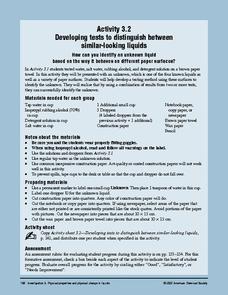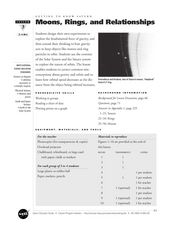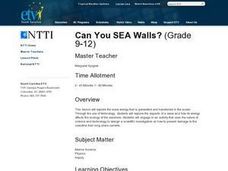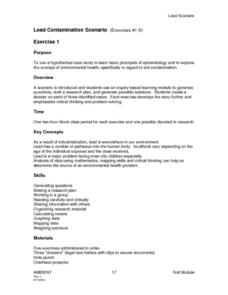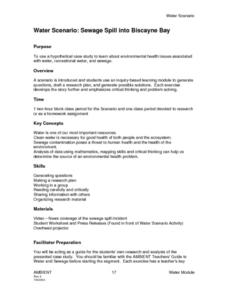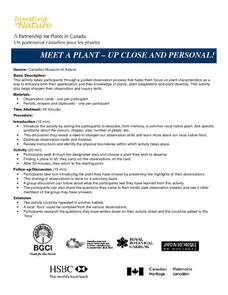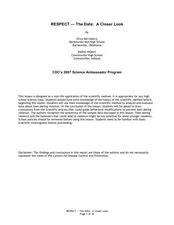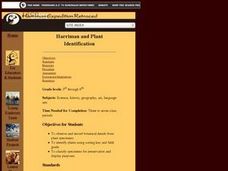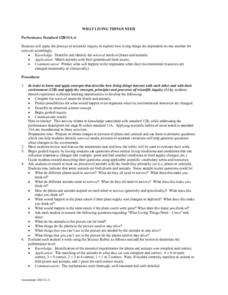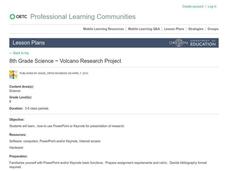American Chemical Society
Developing Tests to Distinguish Between Similar-Looking Liquids
Each group talks about how to test unknown liquids based on their findings in the previous experiment. In this second of four activities, they test unknowns on wax paper, newspaper, and construction paper. As a stand-alone, this lesson...
K20 LEARN
Transpiring Trees: Plant Transpiration and the Water Cycle
Looking for a tree-rific addition to your water cycle unit? Teams of young foresters examine the role of transpiration in the water cycle through a week's worth of activities. Pupils analyze how trees take in and transport water during...
Curated OER
ABCs of Hydrogen and Fuel Cells
Young scholars are introduced to the concept of hydrogen technologies through inquiry-based classroom activities.
Curated OER
Getting to Know Saturn: Moons, Rings, and Relationships
Students identify the different objects that orbit Saturn. In this space science lesson, students plot the graph of orbital speed and distance. They explain why planets and asteroids remain in orbit around the sun.
Curated OER
Peanut Calorimeter Paper
Seventh graders respond to key questions about a science inquiry in groups. In this Peanut Calorimeter paper lesson, 7th graders recall information from a science inquiry and answer questions that will be part of a larger paper. ...
Curated OER
Can You SEA Walls?
Learners explore how wave energy that is generated and transferred in the ocean. They explore the aspects of a wave and how its energy affects the ecology of the seashore. Students engage in an activity that uses the nature of science...
Curated OER
Lead Contamination Scenario
Learners are introduced to a scenario, and students use an inquiry-based learning module to generate questions, draft a research plan, and generate possible solutions. They create a dossier on each of three identified cases.
Curated OER
Sewage Spill into Biscayne Bay
Students use a hypothetical case study to learn about environmental health issues associated with water, recreational water, and sewage. They use an inquiry-based learning module to generate questions, draft a research plan, and generate...
Curated OER
MEET A PLANT - UP CLOSE AND PERSONAL!
Learners sharpen their observation and inquiry skills. They participate in a guided observation process that helps them focus on plant characteristics as a way to enhance both their appreciation and their knowledge of plants, plant...
Curated OER
Life on the Hardbottom
Students find similarities and differences between a biotrope habitat and an ecosystem. In this hardbottom biotrope instructional activity, students research and respond to inquiry questions about a biotrope. Students identify three...
Curated OER
Earth's Energy Cycle: Albedo
Students complete all of the steps in the scientific inquiry process to study Earth's energy cycle; most specifically temperature and the effects of albedo (energy reflected back from Earth's surface) on temperature.
Curated OER
Respect--The Data: A Closer Look
Students explore the steps in the scientific method process. For this science lesson, students identify warning signs that someone is in an abusive dating relationship. They evaluate the credibility of information sources.
Curated OER
Harriman and Plant Identification
Students observe and record botanical details from the plant specimens. They identify plants using sorting key and field guide and classify specimens for preservation and display purposes.
Curated OER
Acids and Bases: Together again!
Students identify principles behind acid-base reactions. They predict factors that may affect an acid-base reaction. Students identify questions and concepts that guide scientific investigations.
Curated OER
How to Build an Electric Motor
Sixth graders build a working motor. In this lesson on motors, 6th graders use an inquiry method of learning to discover how to create a working electric motor with the supplies given to them. The teacher will guide them as needed....
Curated OER
Eating the Food Pyramid
Students explore the concept of the Food Guide Pyramid. For this nutrition lesson, students discuss healthy eating habits after reading the book entitled Gregory, the Terrible Eater. Students then work in groups finding pictures of the...
Curated OER
Dunking Duckies - Endless Expansion And Contraction
Learners use inquiry to explore how their dunking duckie bobs up and down. In this states of matter lesson, the teacher guides the class towards discovering how the dunking duckies continue to bob up and down for days without being touched.
Curated OER
Living Light
Students explain bioluminescence. In this life science lesson, students discuss bioluminescence and conjure examples of organisms that carry this trait and how it is useful in their environment.
Curated OER
Observe a Tree
Tiny tree-huggers observe and examine various species of trees around campus. They use My First Field Guide to Trees to support their observations. Different tree projects are offered that can include using natural materials to make a...
Curated OER
What Living Things Need
Students apply the process of scientific inquiry to explore how living things are dependent on one another for survival. They match animals with their generalized food source. Students predict what happens to the organisms when their...
Curated OER
What Do Parts Do?
Students review the components of the scientific inquiry method. In groups, they identify and describe the components and functions of all of the parts of a plant. Using a diagram, they label the parts of the plant chosen and share...
Curated OER
Scientific Inquiry
Students investigate the general geology, biology, and chemistry of Seneca Lake. They study how to use scientific instruments on the research vessel. They explain how the data they gather will be used by scientists and develop a hypothesis.
Curated OER
Volcano Research Project
Eighth graders research about different types of volcanoes. In this earth science lesson, 8th graders create PowerPoint presentation on the information gathered. They share findings with the class.
Curated OER
Introduction And Brief History of Materials Science
Learners develop an understanding of the concept of matter. They l participate actively in the bubble raft experiment as described on the Center for Thermal Spray Research's website. They demonstrate dislocations and grain...


